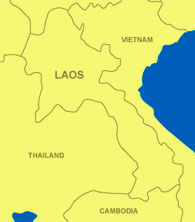HIV outreach educators say Lao men who have sex with men (MSM) are difficult to identify in HIV prevention and surveillance, and are not reached by other MSM programmes in the country.

The IRIN/PlusNews agency reported that the figure represents a "worrying trend" in a country whose neighbours - Cambodia, Thailand and Vietnam - already have documented HIV epidemics in their MSM communities. The study also surveyed risk behaviours among MSM and found that while the vast majority of respondents knew unprotected anal sex was high-risk, less than a quarter used condoms with non-regular partners, and more than half also reported having sex with women.
The institute, said to be Australia's largest virology and communicable disease research centre, warns that a "lack of knowledge about HIV/AIDS among hidden MSM, particularly those who have female partners, could potentially lead to an epidemic in the broader community, something which the country has so far been able to avoid."
Nakhornphet Pasomsouk, an assistant project officer at the MSM peer-education programme of the Burnet Institute was quoted in the report as saying that "many Lao men will try sex with another man at least once in their lifetime."
"Many of them might just be trying it to see what it's like and never do it again; others might do it again. There is not just one category of men having sex with men."
Anan Bouapha, a former MSM project coordinator with the institute, said in the same report that "unlike transsexuals or openly gay men, hidden MSM can be homosexual, bisexual or straight."
"They might not want to be identified as MSM but we need to get the safe-sex message to them, no matter how difficult this is."
Three times a month, the peer educators of the MSM programme run by the Burnet Institute approach and chat with young men heading for beer shacks, video shops, saunas about HIV and other sexually transmitted infection prevention. They are given a brochure and occasionally a condom before the young men move on for their evening's entertainment.
Read more by clicking the related link below.











 列印版本
列印版本










讀者回應
請先登入再使用此功能。